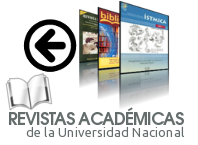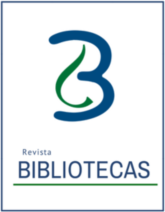Library Electronic Scriptorium: A Contribution to the Research and Teaching of Philosophy, Letters, Identity and Culture
DOI:
https://doi.org/10.15359/rb.36-2.2Keywords:
Management Knowledge, University Repositories, Electronic Libraries, Documentary Heritage, Opens Information SystemAbstract
The present work, which transcribes the project registered in the system of the National University academic formation, describes the first experiment used for management and control of the intellectual production of the Faculty of philosophy and letters, through the creation of a library and a repository for the purpose of identify, conserve and preserve the historical memory which is that academic work in the areas of knowledge have been studied and which are currently studying: philosophy, culture, literature, translation, Linguistics, librarianship, documentation, studies of gender, religion and society, ethics, human rights, Central American and Latin American studies.
That information had not been registered and was not available for viewing in the documentary collections in the collections of the libraries; In addition, was mostly scattered on desktops and in the houses of room, on shelves of the writers, mostly in printed format; and another, until on the memorabilia personal.
References
Bawden y Rowlands, (1999). Digital Libraries: assumptions and concepts. Libri, vol. 49. Recuperado de https://pdfs.semanticscholar.org/acdc/6bd339e3ac81558dee63fb5059de 1e4699fb.pdf
De Volder, C. (2008). Los repositorios de acceso abierto en la Argentina: Situación actual. Información. Cultura y Sociedad, 19.
Faba, C. y Nuño, M. (2004). La nueva gestión en las bibliotecas virtuales. Boletín de la Asociación Andaluza de Bibliotecarios, 74, En: http://eprints.rclis.org/6202/1/74a2.pdf
Facultad de Filosofía y Letras. (2016). Biblioteca Electrónica Scriptorium. Recuperado de http://www.scriptorium.una.ac.cr
Fitzgerald, M. y Galloway, C. (2001). Relevance judging, evaluation, and decision making in virtual libraries: a descriptive study. Journal of the Association for Information Science and Technology, 52 (12). Recuperado de http://onlinelibrary.wiley.com/doi/10.1002/asi.1152/abstract
INCE, D. (2001). A dictionary of the Internet. Oxford: University Press.
López, C. (2000). Modelo para el desarrollo de bibliotecas digitales especializadas. México: C. López Guzmán.
Manso, A. (2015). La biblioteca y sus ofertas: reflexiones a partir del desarrollo tecnológico actual. Ciencias de la información, 46 (3).
Pérez, D. (2000). La biblioteca digital. Recuperado de http://www.uoc.edu/web/esp/articles/La_biblioteca_digital.htm
Rojas, M. (2012). Scriptorium: una biblioteca necesaria, en Suplemento cultural, Universidad Nacional, 105. Recuperado de http://www.icat.una.ac.cr/suplemento_cultural/index.php/features/292-margarita-rojas-g/1056-scriptorium-una-biblioteca-necesaria-margarita-rojas-g-suplemento-105
Sánchez, S y Melero, R. (2006). La denominación y el contenido de los repositorios institucionales en Acceso Abierto: base teórica para la “Ruta Verde”. Recuperado de http://eprints.rclis.org/7613/1/Denominaci%C3%B3n_contenido_OA.pdf
Sreenivasulu, V. (2000). The role of a digital librarian in the management of digital information systems (DIS). The Electronic Library, 18 (1). DOI https://doi.org/10.1108/02640470010320380
Downloads
Published
How to Cite
Issue
Section
License
Bibliotecas provide immediate open access to their content, based on the principle of facilitating research to the public free of charge and free of charge to promote the global exchange of knowledge.
The journal Bibliotecas is a publication hosted by a public higher education institution, which is supported by public resources. Since its inception, the magazine has offered all its contents free of charge without any restriction on the rights of: reading, downloading and printing in full text. Works published in libraries may be analyzed, quoted and reproduced in whole or in part, mentioning the original source.
The journal Bibliotecas is licensed under the Creative Commons Attribution - Non-Commercial - Share Equal, 4.0 International license; therefore, it is allowed to: share, copy and redistribute the material in any medium or format.

Este obra está bajo una licencia Creative Commons Atribución-NoComercial-CompartirIgual 4.0 Internacional.








